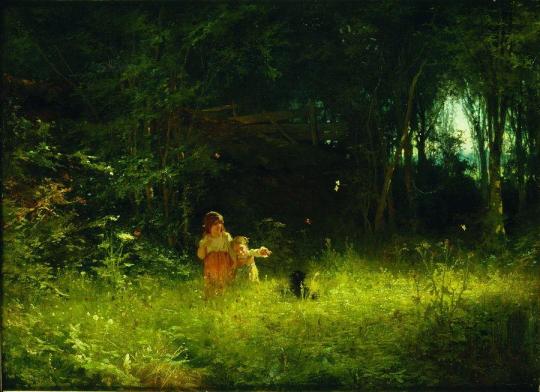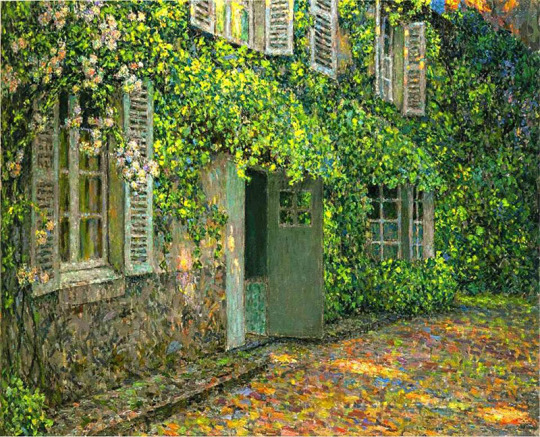Mostly Gilbert & Sullivan, Shakespeare, 19th-century Russian literature. Other things that sometimes show up here: language/linguistics stuff, translations from various languages, metered verse, music discussion, photos of my knitting.
Don't wanna be here? Send us removal request.
Photo

I ain’t afraid of no goats.
283K notes
·
View notes
Text
The field was hopping — loads of quarry to Pursue. “Wait, let me count them… fifty-three. That’s twenty-six point five of them for you, The other twenty-six point five for me.” “Oh, just take twenty-seven as your due,” His neighbor groaned exasperatedly, “Not that we’ll even catch them all! So there’s No point that I can see in splitting hares.”
5 notes
·
View notes
Text
I have been thinking of this Canal+ ad with napoleon in it
3K notes
·
View notes
Text
random anecdote for father's day: one time during a long car ride my dad asked me, "you're familiar with Murphy's Law, right?" and i was like "isn't that the one about how anything that can go wrong will go wrong?" and he said "yeah, exactly" and i said "why do you ask?" and he went "well, have you heard of Cole's Law?" and i said "no, actually, what's that?" and he said "it's mostly lettuce and carrots with a little dressing mixed in"
45K notes
·
View notes
Text
An amusing theme that keeps showing up in my side readings: people remembering some of Pushkin’s works as having been published before they actually were. My favorite example of this is probably A. P. Raspopov’s lively account of the time his hussar regiment got drunk with Pushkin, with toasts “to everything that came to mind: to the health of his nyanya, and to Tanya, and to Lensky (rest his soul)” because “everybody was wild about Yevgeny Onegin”… in summer of 1824. Pushkin would have only been working on Ch.3 at the time, and Ch.1 wouldn’t even be published until 1825. Oops.
9 notes
·
View notes
Text
Onegin update: The past week was kind of a slog at times, but I’m getting there. I feel like I’ve been staring intently at the back of an embroidery hoop — more aware of the tangled threads, than of the pattern. But now things are looking tidier again. I’ve gotten through *almost* all of my footnote edits.
What’s left: a few chronology things to resolve; two explanations of versification details to revisit; one line to tweak in the translation proper (a subtle thing, but now that I’ve noticed it, I can’t unsee it, and I have to deal with it); one more poem to translate for the footnotes to Onegin’s Journey. There is also still some ongoing footnote-wrangling in the memoir material I’ve pulled in as supplements to the discarded chapters. Oh, and I need to finish my general introduction to the discarded materials.
Meanwhile, I have started the third stage of editing: systematic review of translated prose passages, especially material I worked with early in the project.
15 notes
·
View notes
Text
Standing by the oldest oak in the woods by the park, early June, 2020.
268 notes
·
View notes
Note
I'm not sure if you'll know the answer to this, but for the regency era, how common are contractions in letters and speech? Not the "Wm." for William kind, but your standard "couldn't," "wouldn't" and "shouldn't?" Thanks!
All common English contractions did exist by the Regency period. However, there is very limited period documentation or scholarly research as to whether they were viewed as "proper" English or not at the time.
Contractions were first used in the English language sometime in the last half of the 16th century, and by the late 17th and early 18th centuries were approaching what most people today would probably consider over-use.
By the time the Regency era rolled around however, many older uses of contractions had already fallen, or were in the midst of falling, out of favor. 'Tis, 'twas, ne'er, e'er, e'en, tho', thro', etc., were mostly confined to poetry by the early 19th century (though 'tis seems to have hung on a little bit longer than the others).
The last half of the 18th century had also already seen the almost complete disappearance of the most common use of English contractions in the 17th and early 18th centuries - using 'd in place of -ed - as seen here in an example from the 1736...

The frequency of use of contractions in the Regency period specifically, seems to have varied greatly from person to person. Jane Austen herself used very few contractions in her novels compared to some of her contemporaries. Couldn't, wouldn't and shouldn't do not appear at all in Pride & Prejudice, Sense & Sensibility or Emma, and all other contractions were used very sparingly.

In P&P, I counted one appearance of "I'm", one of "you'll", one "won't", two "can't"s, three "shan't"s and six "don't"s.
I compared this to Evelina, by Frances Burney (published in 1778) which (just in Volume One) includes: 14 occurrences of can't, 4 of won't, 35 of don't (vs only 15 of 'do not') and 11 of shan't (3 spelled shan't and 8 sha'n't).
Though couldn't, wouldn't and shouldn't all appear in Evelina as well (in an archaic forms which included a space between the modal verb and n't: could n't, would n't, should n't), I did notice they are used much more by lower class characters than by upper.
There seems to be some evidence that negative contractions (those ending in n't) began to be considered improper English in the latter half of the 18th century, and subsequently generally fell out of favor with the upper classes.
The Grammatical Wreath... by Alexander Bicknell, published in 1790, specifically cautions against using contractions in correspondence with social superiors.
"And be careful in not omitting any letter belonging to the words you write; as, I've, can't, don't, shou'd, wou'd, &c. instead of I have, cannot, do not, should, would; for such contractions not only appear disrespectful and too familiar, but discover ignorance and impudence."
This very interesting paper (which you can view in full if you have a free JSTOR account) analyzes the grammatical trends found through 50 years (1730s-1780s) of the correspondence of writer Elizabeth Montagu. The author marked a significant falloff in the use of negative contracted modal and auxiliary verbs over the course of Montagu's letters. In the 1730s Montagu used un-contracted negatives 62% of the time and contracted 38%, but by the 1780s Montagu used no contacted negatives at all.
Granted these are only the letters of a single person and, as the author notes, could have many other explanations (age, change in social class, familiarity with the correspondent, etc.), it does seem to reflect what I've personally observed in writing from this period.
So the answer to your question is - yes, contractions existed and yes, they were in fairly common use - with the asterisk that how they were viewed by society is not terribly well documented for the Regency period.
So I'd personally say feel free to use them in any Regency era stories you may be writing, but do so sparingly with very proper or upper class characters.
If you're aiming for very authentic period flavor, you could also try throwing in some contractions that have fallen out of use over the past two centuries - shan't, mustn't, needn't, mayn't, etc. I'd especially recommend using 'shan't' in place of 'shouldn't' where appropriate, and also remembering that if you're using 'can not' instead of 'can't' it is always one word - cannot.
One thing that is period authentic, but I won't personally recommend to any Regency era writers (unless you want to throw some meta commentary on the chaos that is the English language into an epistolary) - is that no one really agreed where to put the apostrophe in wouldn't/couldn't/shouldn't until well into the 19th century. It's very common to see the n't separate as in the examples from Evelina, but I've also seen wou'd'n't, would'nt, wou'd'nt, etc. etc. etc., sometimes multiple different ways within a single paragraph.
Hope some of that was helpful. I had fun digging into it!
287 notes
·
View notes
Text

Another picture of the mist that morning, 14th of June 2020.
741 notes
·
View notes
Text

Vincent van Gogh (Dutch 1853-1890)
Cypresses, 1889
"Cypresses" was painted in late June 1889, shortly after Van Gogh began his yearlong stay at the asylum in Saint-Rémy.
The Metropolitan Museum of Art, New York
@metmuseum
343 notes
·
View notes
Text

Ivan Kramskoi - Children in the forest (1887)
192 notes
·
View notes
Text
YMCA in Akkadian (Ancient Babylonian), as written by Gilgamesh's exasperated tourism minister trying to attract more gay guys to Uruk to keep Gil distracted from politics:
.
Eṭlū!- Young men!
Lā tuštamarraṣā- Do not, do not be troubled!
Aqabbi, eṭlū!- I said, young men!
Lā lā taṣallalā- Do not, do not lie down!
Aqabbi, eṭlū!- I said young men!
Šunu ina ālim- You are in a town,
Bēt bēt šikārim ḫanbā- Where taverns sprout luxuriously,
Eṭlū!- Young men!
Ina ālim alkā- Go to the city,
Aqabbi, eṭlū!- I said young men!
Bēt kaspī ul tīšâ- When you do not have money,
Annikīam tuššabā- Here you can dwell,
Bēt napṭirim nīšu- We have guest-houses,
Itti awīlī umtallâ- They are filled with men….
.
Taḫaddâ ina - You’ll have fun in
𒌋𒊏𒌋𒅗 U-RA-U-KA! - U-R-U-K!
Wašābum ṭāb ina - The living is good in,
𒌋𒊏𒌋𒅗 U-RA-U-KA!- U-R-U-K!
Ziquratum elâ! Purattum amrā!- Climb up the ziggurat! See the euphrates!
Šikārum ṭābum šitâ!- Drink fine beer!
Taḫaddâ ina - You’ll have fun in
𒌋𒊏𒌋𒅗 U-RA-U-KA! - U-R-U-K!
Wašābum ṭāb ina - The living is good in,
𒌋𒊏𒌋𒅗 U-RA-U-KA!- U-R-U-K!
Amuḫḫūni šaqû! Ziqnūni ītebbū! - Our walls are high! Our beards are shiny!
Nuppušātunu!- You are allowed to breathe [relax]
.
Eṭlū!- Young men!
Eṭlū šimeanni!- Young men listen to me!
Aqabbi, eṭlū! Agana šimeanni!- Young men! Come on, listen!
Aiālam terrišāšu- You desire assistance,
Shū ali īde- This I know for certain!
Šārqum wērum ul ninaddinkunūti- We will not sell you poor copper,
Eṭlū! Ālum ša Uruk bani- Young men! The city of Uruk is beautiful!
Aqabbi eṭlū! Bālātka tezzibši!- I said young man! Leave your pride behind!
Nušallakkunūti- We cause you to go,
Ina Uruk alkā!- Go to Uruk!
Ūmum anniam iseddūkunūti- Today they will help you…
.
Taḫaddâ ina - You’ll have fun in
𒌋𒊏𒌋𒅗 U-RA-U-KA! - U-R-U-K!
Wašābum ṭāb ina - The living is good in,
𒌋𒊏𒌋𒅗 U-RA-U-KA!- U-R-U-K!
Šarrum šitpiṣā! Ittmalûšu ṣālā! - Wrestle the king! Fight with him!
Ittīšu mekkê mēlilā!- Play ball with him!
Taḫaddâ ina - You’ll have fun in
𒌋𒊏𒌋𒅗 U-RA-U-KA! - U-R-U-K!
Wašābum ṭāb ina - The living is good in,
𒌋𒊏𒌋𒅗 U-RA-U-KA!- U-R-U-K!
Ziquratum elâ! Purattum amrā!- Climb up the ziggurat! See the euphrates!
Šikārum ṭābum šitâ!- Drink fine beer!
.
Eṭlū! Bilītkunu īde! - Young men! I know your burdens
Amtaraṣ! Ina šinigī- I was unwell, in my village,
Ātanaḫ! Erēšum ezzēr- I was tired, I hated plowing,
Awīlum ana yâšim iṭeḫḫe- A man to me approached,
Inūšu! Awātum awânim- Then! Words were said to me,
Šumašu, Sîn-lēqi-unninni- His name was Sîn-lēqi-unninni!
Ina Uruk alkā! Iqabbi ana yâšim- Go to Uruk! He told me,
Ina Uruk awīlī ūterrešū- In Uruk men are needed…
.
Taḫaddâ ina - You’ll have fun in
𒌋𒊏𒌋𒅗 U-RA-U-KA! - U-R-U-K!
Wašābum ṭāb ina - The living is good in,
𒌋𒊏𒌋𒅗 U-RA-U-KA!- U-R-U-K!
Ziquratum elâ! Purattum amrā!- Climb up the ziggurat! See the euphrates!
Šikārum ṭābum šitâ!- Drink fine beer!
.
Eṭlū!- Young men!
Addāniqa tallkānim- Please come
Aqabbi, eṭlū!- I said, young men!
Inam anniam ezêršu- I hate this job…
Aqabbi, eṭlū!- I said, young men!
Anāku ānḫāku - I’m so tired….
Bēt bēt šikārim ḫanbā- Where taverns sprout luxuriously,
Taḫaddâ ina - You’ll have fun in
𒌋𒊏𒌋𒅗 U-RA-U-KA! - U-R-U-K!
(Šarrum lillam ina - The king is an idiot in
𒌋𒊏𒌋𒅗 U-RA-U-KA!- U-R-U-K…)
Ao3 link
2K notes
·
View notes










